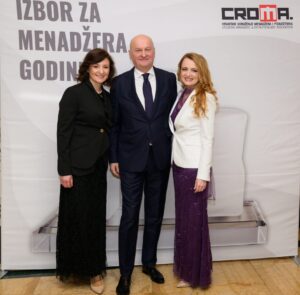CROMA will continue to play a crucial role in fostering growth, education, corporate social responsibility and professional integrity to ensure that managers and entrepreneurs in Croatia can compete at the highest levels.
Managers, particularly in Croatia, face various challenges that often go unnoticed by the general public, for Diplomacy&Commerce says Ana Soldo, Subregional Managing Directorat DS Smith, Packaging Division, responsible for operations in Croatia, Serbia, North Macedonia, Bosnia and Herzegovina and Hungary and president of HUM – CROMA. It all begins with an idea. Croatia is now a country with two unicorns, but they succeeded despite, and not because of our fostering ecosystem. We are here to help create one encouraging people to dare, to dream big and to support them, says Mrs Soldo.

- The Croatian Association of Managers and Entrepreneurs CROMA is the first independent national professional association that has been continuously working for 30 years to improve the public dignity of the management profession, entrepreneurial culture and overall management capacities of the Croatian economy. How would you assess all the aforementioned segments of your work today – where and in what position are Croatian managers today?
Overall, Croatian managers today have made significant strides in professional development, entrepreneurial thinking, and global engagement. They are in a much stronger position than 30 years ago, but they must continue to evolve, embrace innovation, and navigate the challenges of a rapidly changing global economy. The Croatian management community is on the right track, but the journey is far from over. CROMA is an association of managers and leaders, and it’s inspiring to see how it grows day by day. It’s wonderful to witness how colleagues in leadership positions genuinely care about mutual support, engagement, and mentoring younger colleagues. These are individuals who do not accept limits—they push them. Every great success starts with a vision, but a vision alone is not enough. It takes courage to face the unknown, perseverance to continue when times get tough, and the responsibility and strength to lift others along with us. Leaders who prove their worth every day through their actions, not just their hierarchical positions are to be celebrated.
2. How would you assess entrepreneurial culture and what does it actually mean?
I would define it as the collective mindset, values, behaviors, and practices that foster and sustain entrepreneurial activity in a society. It’s not just about starting businesses or launching products, but about creating an environment that supports risk-taking, innovation, resilience, and long-term thinking. In Croatia, this entrepreneurial culture has undergone substantial transformation, and while there is much to be proud of, there are still areas for growth and development. It all begins with an idea. Croatia is now a country with two unicorns, but they succeeded despite, and not because of our fostering ecosystem. We are here to help create one encouraging people to dare, to dream big and to support them. It’s all about people. People initiate change, people drive it forward, and people innovate. CROMA aims to empower outstanding individuals to inspire others toward creative thinking, innovation, and collaboration, including through our awards recognizing the most successful managers and entrepreneurs. These awards are not just acknowledgments of achievement; they are beacons—proof that hard work pays off, that integrity is rewarded, and that courage holds real value. Promoting excellence serves as motivation for others and stands as a testament that success is possible.

- When we say manager, in most cases we think of well-paid jobs, management positions and mostly what is visible to the outside world, but we do not know the background. What would you single out as the biggest problems in your sector (legislation, market, different habits, etc.) and how can they be changed and solved? Who are your interlocutors on the other side?
As the president of CROMA, I recognize that the role of a manager is multifaceted, and while many people associate management with high-paying, visible positions, the reality behind the scenes is much more complex. During his address at our awards ceremony honoring the Manager and Entrepreneur of the Year, Mr. Branimir Muidža, a member of the CROMA Board of Directors, poignantly stated that these individuals will not be welcomed by thousands in the town square, nor will their achievements be celebrated with the fanfare we often reserve for our athletes. Instead, their moment of success is often brief and personal—because by the next morning, new challenges await on their desks. We must ask ourselves: what is the true weight carried by managers, the ones responsible not only for their own work but for the salaries, wellbeing, and stability of entire teams—and by extension, hundreds of families? Their job doesn’t end at five o’clock. In fact, there is no clock. Especially in these uncertain and turbulent times, we need leaders—visionaries—who lead by personal example. In an era marked by rapid and unpredictable change, making long-term sustainable decisions has become increasingly difficult. Global economic and political shifts occur daily; the world order itself is being reshaped before our eyes. In such an environment, leaders must serve as anchors for their people, offering stability and a sense of security. But to do that, they themselves must be strong, resilient, and persistent. They must deeply believe in their vision and in their teams. And that kind of trust is built day by day, decision by decision, through presence, integrity, and unwavering commitment.
- How would you assess the position of Croatian managers and your colleagues in other EU countries, the surrounding area? What are the similarities and differences in approach and action?
Managers across the globe are united by one common reality—perpetual global change. From geopolitical shifts and redefined world order, to emerging technologies, climate change, aging populations, and labor shortages, these are challenges that go far beyond the local context. In today’s environment, it is essential for every leader to focus on cultivating a culture of resilience within their teams. Change is inevitable, and building the capacity to adapt and thrive amid uncertainty has become a critical leadership priority.

- CROMA, among other things, advocates for greater visibility of managers in society. In this regard, you organize numerous activities. What would you highlight from your plans for the upcoming period?
The Annual Award continues to grow each year, reflecting the increasing desire of people to be part of this prestigious event. The awards evening showcases a vision of excellence in Croatia that is rarely seen in mainstream media. This year, we recorded our highest number of attendees and to date—the venue was filled to capacity, with demand exceeding available seating. Our Managers’ Congress, traditionally held in Opatija, also consistently attracts high attendance. These gatherings provide managers and entrepreneurs with a platform for mutual support, helping them to face everyday challenges with greater resilience. They foster not only business collaborations but also lasting friendships. The values that guide us—integrity, excellence, diligence, perseverance, and tenacity—are at the heart of everything we do. These events also create networks that extend beyond national borders, which is truly inspiring. Managers and entrepreneurs are the ones creating new opportunities and opening fresh perspectives. Through CROMA’s activities, it is a privilege to support and encourage them—to inspire them to take bolder steps and to stand beside them in building a better society and a brighter future.As the oldest organization of its kind in the region, which has also assisted in the establishment of similar associations in neighboring countries, we are now looking to strengthen our project-based collaboration with these partners. This will be a key focus of our efforts in the near future.
- You are a manager yourself and know best how to run a company. To what extent do managers have the right to make mistakes and how should their own mistakes and those made by others in the system be evaluated?
We are all afraid of making a mistake. But the most important is that we learn from our mistakes, to rise if we fall, no matter how many times. The goal is reachable if we do not give up. I deeply understand that making mistakes is an inherent part of management and leadership. It’s an inevitable aspect of navigating complex, ever-changing business environments. The key question is not whether managers or employees can make mistakes, but how these mistakes are evaluated and managed to create a culture of learning, growth, and accountability.

- How important are the education and personal development of managers themselves, and monitoring new technologies in their work?
I firmly believe that education and personal development are crucial to the success of managers, as well as to the overall health of any organization. In today’s rapidly evolving business landscape, managers must embrace lifelong learning to remain effective and relevant. Continuous development is essential—not only for enhancing leadership capabilities but also for keeping pace with emerging industry trends and technological advancements. By staying abreast of new technologies, managers can drive operational efficiency, make strategic decisions based on real-time data, and maintain a competitive edge in a technology-driven marketplace. Equally vital is the cultivation of mental and emotional intelligence. As workplaces become increasingly diverse and multigenerational, managers are required to lead teams composed of individuals with varying mindsets, educational backgrounds, values, and cultural perspectives. Effective leadership today means recognizing these differences, understanding their implications, and leveraging them as strategic assets. A manager who can foster inclusion, adaptability, and cross-generational collaboration is better positioned to build resilient, innovative, and high-performing teams.